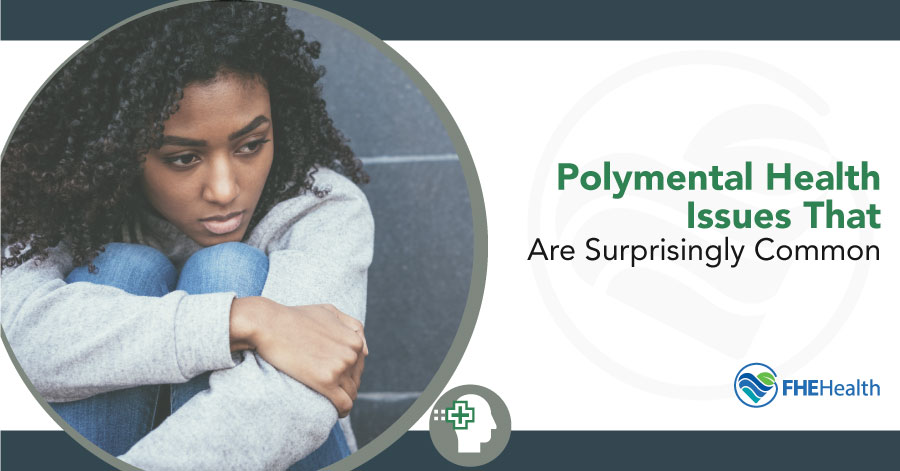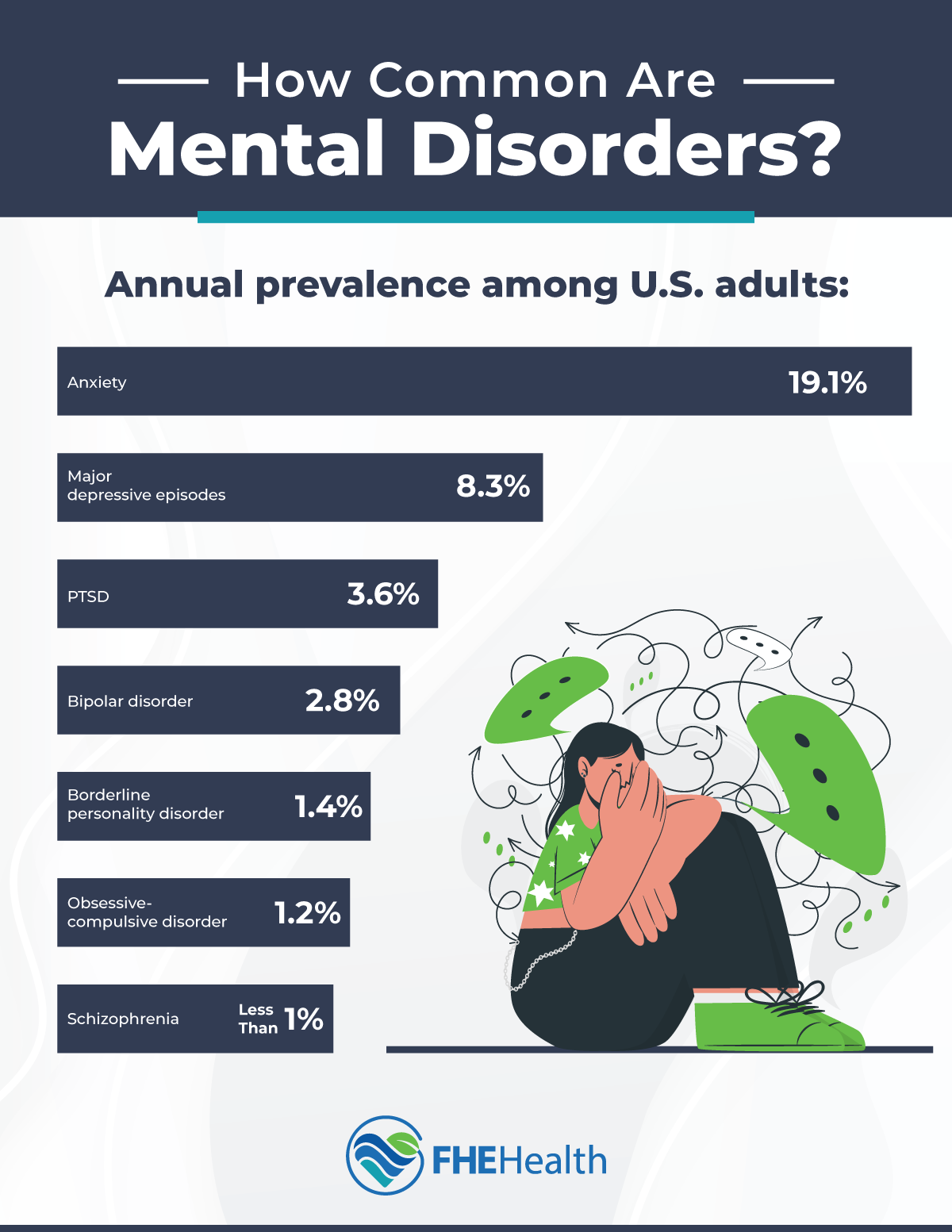
Most often, mental health disorders are talked about in isolation. For example, individuals may suspect that someone suffers from depression, or they’ll recognize the signs of addiction.
But sometimes, individuals may have multiple mental illnesses. In fact, it’s quite common for mental health disorders to overlap.
Approximately one in four, or 26%, of adults in the United States, live with a mental health condition. Additionally, it’s estimated that 5.8% of adults have two disorders, and 6% have three or more.
If a person is experiencing two or more disorders simultaneously, they must receive a diagnosis and treatment for each condition. Addressing each condition is critical to receiving proper and effective treatment.

Defining Polymental Health Disorders
Polymental health disorders, also known as co-occurring disorders or dual diagnoses, refer to when an individual has two or more mental health conditions. These conditions can begin at the same time or may overlap. While not always the case, one condition may trigger the other.
Living with one mental health condition is challenging enough. Unfortunately, having multiple mental disorders adds an extra layer of difficulty. Patients need to find a mental health professional who can recognize the symptoms of each condition, diagnose them, and create a treatment plan for each one.
Having multiple mental illnesses can also add confusion to a person’s experience with their condition. For example, let’s say an individual who’s been diagnosed with anxiety has not been diagnosed with obsessive-compulsive disorder (OCD). They receive treatment for the anxiety, but they feel hopeless or misunderstood because they don’t realize that their OCD plays into their anxiety.
Diagnosing only one condition, rather than the full scope of poly-mental health disorders, can negatively impact the individual. It may leave a person:
- Feeling that treatment isn’t working
- Feeling misunderstood by their therapist
- Finding it difficult to relate to others with their condition because unknown to them, they have two conditions
- Finding it challenging to understand triggers
The Most Common Polymental Health Disorders
Depression and Anxiety
Many individuals suffer from depression and anxiety simultaneously. Almost one-half of individuals diagnosed with one of these conditions are also diagnosed with the other. Additionally, an individual with an anxiety disorder is six times more likely to end up hospitalized for a psychiatric disorder.
Unfortunately, these conditions can feed into and trigger each other. For example, a person who goes through a depressive episode and misses several days of work may then suffer from an anxiety-induced panic attack about skipping all that time. Alternatively, criticism can trigger a person’s anxiety so they start to think they’re disappointing everyone around them and fall into a depressive state. It’s easy for these two disorders to co-occur in an individual.
Substance Abuse and Mental Illness
While the term poly-mental health issues are quite broad, the term co-occurring disorders is often used to describe a particular set of conditions. Co-occurring is typically used to refer to a substance use disorder and a mental illness. Approximately 25% of individuals with a serious mental illness also have a substance use disorder.
In these cases, one condition may trigger the other, or they can occur separately. For example, a person may be more susceptible to experimenting with drugs because they suffer from depression and want an escape. Or trying out psychedelic drugs, such as mushrooms, might trigger a person’s first schizophrenic episode.
Eating Disorders and Mental Illness
Many people don’t understand that an eating disorder is a mental illness that’s about a lot more than body image. People often develop eating disorders when they don’t have control over other areas of their lives. Studies show that individuals with an eating disorder frequently have other mental health conditions as well.
Some of the common poly-mental health issues that come with an eating disorder are:
- Anxiety
- Substance abuse
- Depression
- OCD
- PTSD
How to Get Treatment for Multiple Mental Illnesses
Having multiple mental illnesses doesn’t make a person less treatable. On the contrary, if individuals can get an accurate diagnosis for all their conditions, they can get the treatment they need. Receiving proper treatment, such as therapy and medication, can help a person live a happy, fulfilled life.
It’s crucial that a person gets treatment for all their conditions because therapy for just one simply won’t work. For example, imagine if you broke your foot and your arm at the same time. If the doctor only fixed one injury, you wouldn’t fully function in your day-to-day life because you still have an existing injury.
Similarly, polymental health issues are typically intertwined and can impact one another. Let’s look at the very common case of having depression and a substance addiction. You can’t successfully treat the addiction without recognizing that depression might be a trigger that leads to relapses. This person would likely need to treat their depression with medication, therapy or both simultaneously with their addiction.
The good news is that treating poly-mental health issues isn’t that different from treating a single mental illness. The person needs to receive treatment for both conditions, and the counselor needs to recognize how the two conditions may affect each other.
An individual should work with a facility or counselor with the capacity to address all their conditions. Additionally, the consultation and diagnosis sessions should be thorough so disorders aren’t missed.
Treatment for co-occurring disorders will be different for each person. It will depend on various factors, such as the specific conditions, the severity, the support system available, and previous treatment received, among others. Treatment may include individual, group, or family therapy and possibly medication.
FHE Health Is a Full-Service Facility
FHE Health is a full-service facility offering both mental health and addiction treatment. Our staff is experienced in recognizing and treating poly-mental health issues. We believe that the road to recovery is clear and straightforward: Seek help, diagnose the conditions, and build an individualized treatment plan in conjunction with the patient.
Find out how FHE Health can help you or your loved one today by calling (833) 596-3502.






